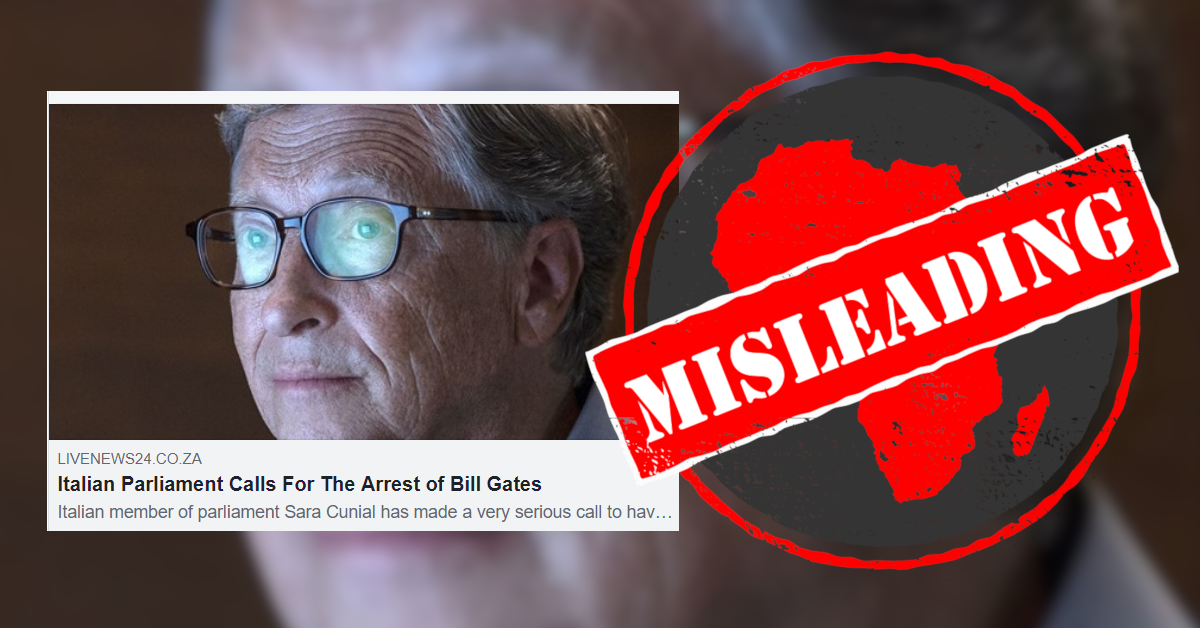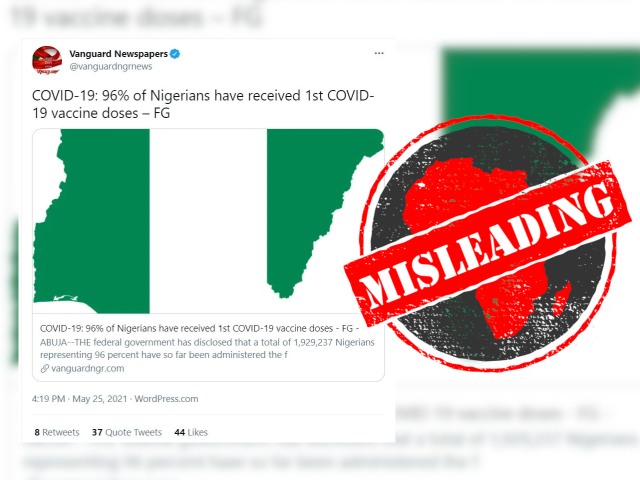Editor's Note: We have unpublished this fact-check as the site on which the article was based altered its original headline from "Italian parliament" to "Italian parliamentarian".
Disclosure: The Bill and Melinda Gates Foundation is one of Africa Check’s funders, providing 11% of our income in 2019.
“Italian parliament calls for the arrest of Bill Gates,” reads the headline of a 15 May 2020 article on the South African website Live24.
“Sara Cunial who is a member of the Italian parliament has delivered a controversial [speech] where she is calling for the arrest of Bill Gates … in her speech Cunial denounced all the lies surrounding the plan to combat Covid-19,” the article says.
Conspiracy theories continue to place Bill Gates at the centre of the Covid-19 outbreak. See some previous examples that we have checked here and here.
Is this article about the billionaire co-founder of Microsoft and his foundation accurate?

During a parliamentary address on 14 May, Cunial did accuse Gates of plans to “depopulate” the world. She criticised his foundation for developing vaccines that she claimed “cause more deaths than the illnesses themselves”.
“Dear President Conte. Next time you receive a call from the philanthropist Bill Gates, please send it directly to the International Criminal Court,” she said in closing.
But there is no evidence that Cunial’s views were endorsed by the Italian parliament. There have been no official statements from the Italian government calling for the arrest of Bill Gates.
While poorly written and confusing, the Live 24 article in fact doesn’t make the claim that the Italian parliament has called for Gates’s arrest. It reports on Cunial’s speech. But its headline is false. – Africa Check
Disclosure: The Bill and Melinda Gates Foundation is one of Africa Check’s funders, providing 11% of our income in 2019.
“Italian parliament calls for the arrest of Bill Gates,” reads the headline of a 15 May 2020 article on the South African website Live24.
“Sara Cunial who is a member of the Italian parliament has delivered a controversial [speech] where she is calling for the arrest of Bill Gates … in her speech Cunial denounced all the lies surrounding the plan to combat Covid-19,” the article says.
Conspiracy theories continue to place Bill Gates at the centre of the Covid-19 outbreak. See some previous examples that we have checked here and here.
Is this article about the billionaire co-founder of Microsoft and his foundation accurate?

Remarks from one politician, not parliament
During a parliamentary address on 14 May, Cunial did accuse Gates of plans to “depopulate” the world. She criticised his foundation for developing vaccines that she claimed “cause more deaths than the illnesses themselves”.
“Dear President Conte. Next time you receive a call from the philanthropist Bill Gates, please send it directly to the International Criminal Court,” she said in closing.
But there is no evidence that Cunial’s views were endorsed by the Italian parliament. There have been no official statements from the Italian government calling for the arrest of Bill Gates.
While poorly written and confusing, the Live 24 article in fact doesn’t make the claim that the Italian parliament has called for Gates’s arrest. It reports on Cunial’s speech. But its headline is false. – Africa Check
Republish our content for free
For publishers: what to do if your post is rated false
A fact-checker has rated your Facebook or Instagram post as “false”, “altered”, “partly false” or “missing context”. This could have serious consequences. What do you do?
Click on our guide for the steps you should follow.
Publishers guideAfrica Check teams up with Facebook
Africa Check is a partner in Meta's third-party fact-checking programme to help stop the spread of false information on social media.
The content we rate as “false” will be downgraded on Facebook and Instagram. This means fewer people will see it.
You can also help identify false information on Facebook. This guide explains how.



Add new comment